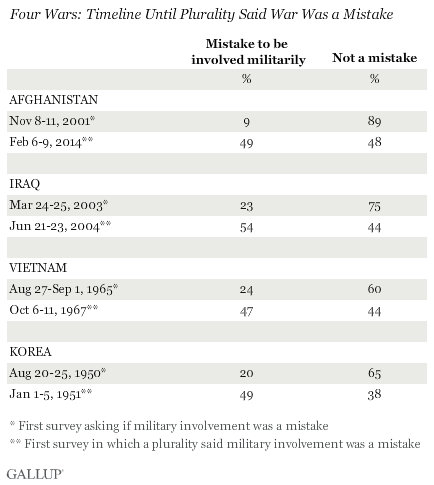49% Americans consider Afghan War a “Mistake”: Gallup International Survey
PRINCETON, NJ: The majority of Americans have rejected US involvement in Afghan war as 49% Americans call this involvement as “Mistake” comparing to 48% who say it was not a mistake.
49% Americans consider Afghan War a “Mistake”: Gallup International Survey. Perception of Americans towards U.S. involvement in Afghanistan has been negative in past also but now it is reaching to all heights of rejection of US involvement in Afghan war. It may be mentioned that the “mistake” percentage reached 25% in 2004, and surpassed 30% for the first time in 2008, and 40% in 2010.

Now, in Gallup’s Feb. 6-9, 2014, World Affairs survey, conducted some 12 years and four months after action in Afghanistan began, Americans’ views essentially split down the middle, with 49% saying involvement there was a mistake and 48% saying it was not. Still, the more than 12-year span during which less than half of Americans thought the U.S. made a mistake in entering Afghanistan has been remarkably long, relative to past U.S. interventions.
Survey Methods
Results for this Gallup poll are based on telephone interviews conducted Feb. 6-9, 2014, with a random sample of 1,023 adults, aged 18 and older, living in all 50 U.S. states and the District of Columbia.
For results based on the total sample of national adults, the margin of sampling error is ±4 percentage points at the 95% confidence level.
Interviews are conducted with respondents on landline telephones and cellular phones, with interviews conducted in Spanish for respondents who are primarily Spanish-speaking. Each sample of national adults includes a minimum quota of 50% cellphone respondents and 50% landline respondents, with additional minimum quotas by time zone within region. Landline telephone and cellphone numbers are selected using random-digit-dial methods. Landline respondents are chosen at random within each household on the basis of which member had the most recent birthday.
Samples are weighted to correct for unequal selection probability, nonresponse, and double coverage of landline and cell users in the two sampling frames. They are also weighted to match the national demographics of gender, age, race, Hispanic ethnicity, education, region, population density, and phone status (cellphone only/landline only/both, cellphone mostly, and having an unlisted landline number). Demographic weighting targets are based on the most recent Current Population Survey figures for the aged 18 and older U.S. population. Phone status targets are based on the most recent National Health Interview Survey. Population density targets are based on the most recent U.S. census. All reported margins of sampling error include the computed design effects for weighting.
In addition to sampling error, question wording and practical difficulties in conducting surveys can introduce error or bias into the findings of public opinion polls.

